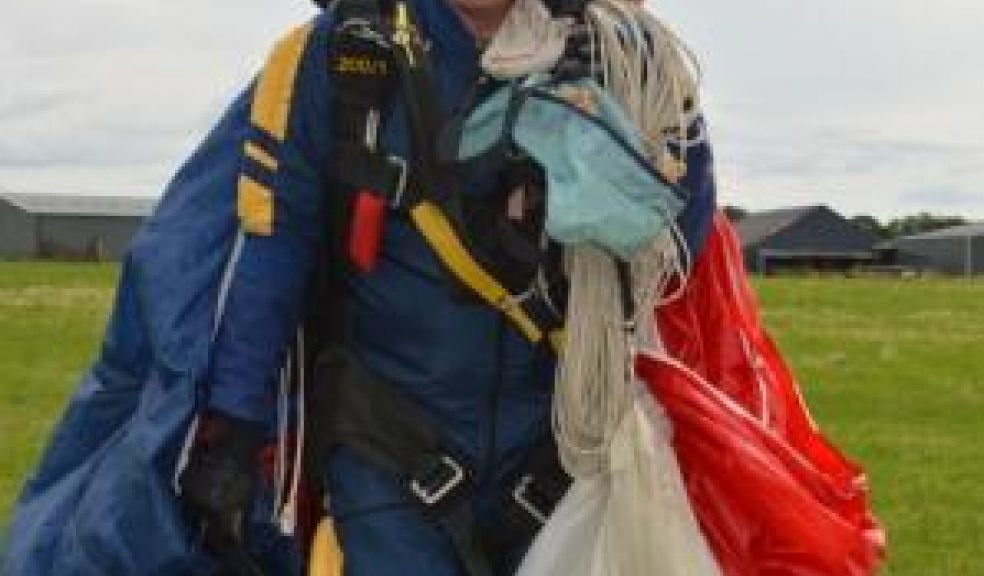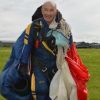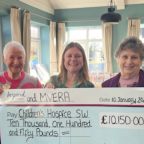
Courageous Sonny skydives at 71 - despite terminal illness
A fearless Exeter granddad is still skydiving - despite having a terminal illness.
Sonny Hepburn, 71, was given 6-12 months to live last September 2013 after being diagnosed with cancer but continues to skydive after recovering from his chemotherapy sessions.
Skydiver Peter Brookes said: “I have the privilege to call Sonny a good friend and so do my two boys Michael and William. They are only three and four but already see how being positive can change our own lives and the lives of others around us. What an amazing role model Sonny is for the next generation.
“We are only here for one life. We can't turn back the clock and we are only here for a short time. Sonny has made the most of his life and he is still living it today. Jumping out of planes, having fun, affecting people’s lives around him and his own, in the best of ways.”
Sonny, who lives in Exwick, is a former Para who wants his story to help others living with life limiting illnesses.
“When I’m skydiving I get a real buzz, it’s exhilarating,” said Sonny.
“No matter how many times I do it I always get the same feeling. There are days when I forget I’ve got cancer.”
The father of five, who lives in Exwick, said: “I have oesophageal cancer which has spread to the liver. I have to deal with knowing that this is terminal. I have regular chemotherapy sessions which make me feel nauseated and tired but I fight it and try to live a normal life. I have to deal with it and do something about it. I try to keep active and do what I did before, then I can go to bed and say that’s another day completed.”
He wants to encourage other terminally ill people to continue to lead as normal a life as they can.
“Go for a walk, visit friends do something to get out and about. Don’t get me wrong I get my moments when I feel really rotten, so I think about the weekend and going out with the boys skydiving. They are a terrific bunch of guys."
When Sonny has recovered sufficiently from his chemotherapy he meets up with his friends at Dunkeswell Airfield, near Honiton, and drives the bus picking up skydivers from the drop zone. If he’s well enough he’ll do his own jump from 15,000 feet which includes a minute of freefall before he has to pull his parachute.
Peter who works for Skydive 99 based Dunkeswell Airfield, has made a video of Sonny skydiving which you can view at www.hospiscare.co.uk
“When you watch this video please try to realise how powerful it is,” said Peter.
“And this power or positivity as I like to say is in all of us. The sad thing is that the minority of people live like this.”
Sonny is aiming to achieve a level C skydiving licence - D is the top level.
“I just need four more skydives to get that certificate,” he said.
“Over the years I haven’t bothered with the licence but now I want to get it so I can jump in higher winds and do more manoeuvres.”
On leaving the Paras Sonny worked as a chef on North Sea oil rigs and then became a European truck driver before retiring in August 2013. Just a month later he was diagnosed.
“It was a shock at first then after a good cry I sat down and we talked it through. I talked individually to all my children about it; we are all very open about it. My family treating me normally helps me be positive because I have to deal with the prognosis all the time.”
Sonny’s wife Sylvia said:”He wants to go on as normal as possible so that’s what we are giving him.” Nurses from local charity Hospiscare have helped the couple deal with finances, paperwork and talking about his illness. “It is a great help. The nurses are wonderful,” said Sonny.
He is eager to help people understand terminal illness and took part in a recent Hospiscare discussion with medical students. Sonny was one of six patients talking openly about their prognosis and how they cope with it.
Jim Gilbert, Hospiscare medical director, said: “Sonny’s story is an inspiration, not least to us here at Hospiscare who are helping looking after him. He underlines several key messages, firstly he is an example of our wish to help people live until they die, secondly he shows how openness with friends and family can help in understanding adjusting to life limiting illness and thirdly in his work with medical students he reinforces our strong desire to pass on understanding and learning to the next generation of doctors and healthcare workers.”





















